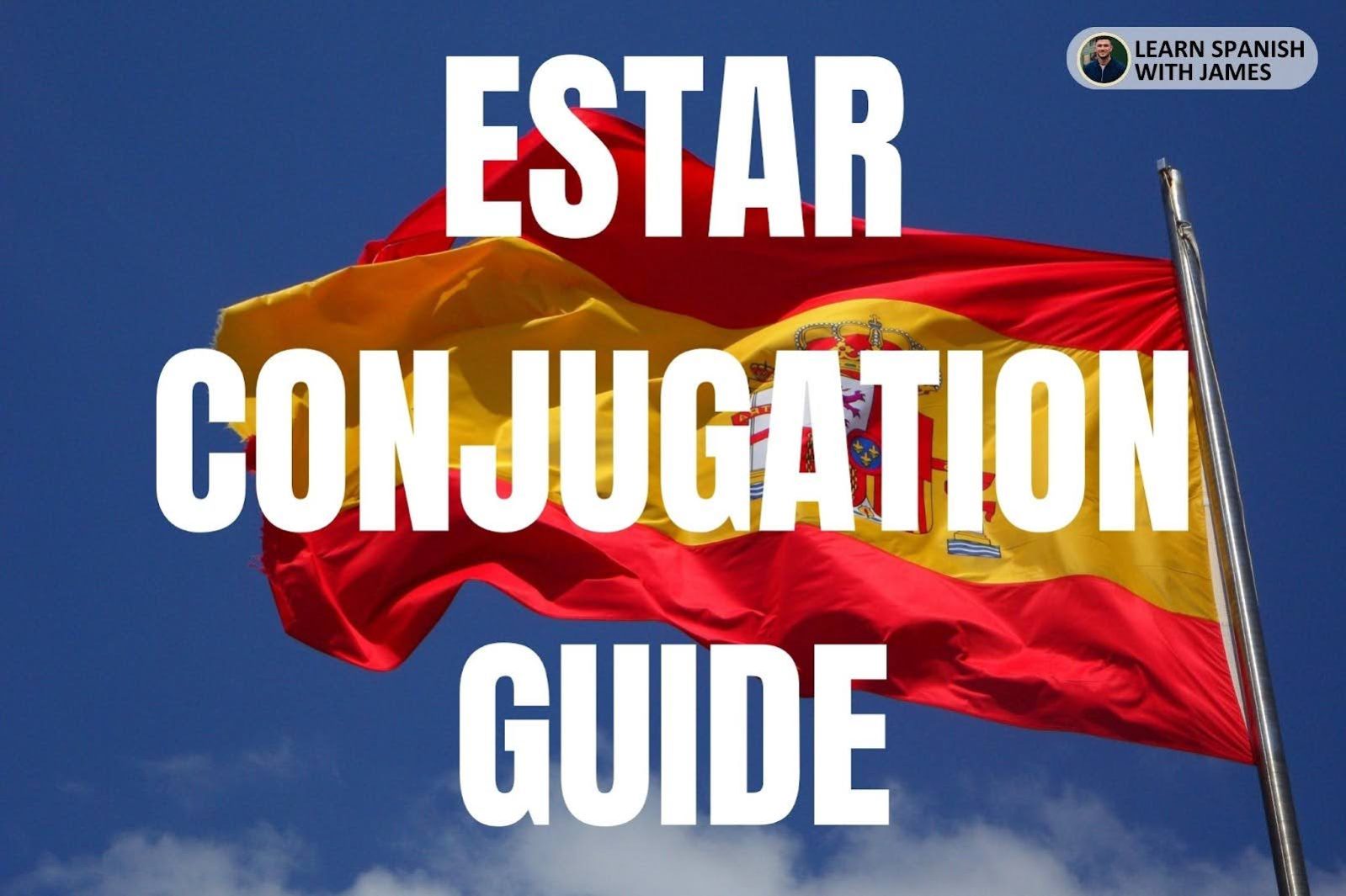Estar Conjugation Chart & Full Tense Guide

The irregular verb “estar” is a key Spanish verb meaning “to be”. It is indispensable for expressing temporary states and conditions.
I’m James, from Learn Spanish With James, and in this Spanish verb conjugation guide, I’ll take you through all conjugations of “estar” with a conjugation chart in each tense.
We’ll cover indicative, subjunctive, and imperative moods, including simple and compound tenses in the Spanish language.
Whether you’re a beginner or aiming for fluency, this guide will make it easy for you to see how to conjugate ”estar” and use it in a variety of contexts.
Present Tense
Pronouns Pronombres
I yo estoy
you tú estás
he/she/it/you (formal) él, ella, usted está
we nosotros, nosotras estamos
you (plural) vosotros, vosotras estáis
they, you (pl. formal) ellos, ellas, ustedes están
When We Use The Present Tense
The present tense of the verb “estar” in Spanish is used to indicate temporary states, conditions, or locations. It describes how someone or something is feeling or where they are located at the current moment.
For example, “Estoy feliz” means “I am happy,” and “Estamos en casa” means “We are at home.”
Examples of the Present Tense “Estar” Conjugation
- Yo estoy en la universidad. (I am at the university.)
- Tú estás en mi casa. (You are at my house.)
- Él está en el hospital. (He is at the hospital.)
- Ella está en el trabajo. (She is at work.)
- Nosotros estamos en el parque. (We are in the park.)
- Vosotros estáis en la playa. (You all are at the beach.)
- Ellos están en la biblioteca. (They are at the library.)
- Ustedes están en el restaurante. (You are at the restaurant.)
Preterite Tense
Pronouns Pronombres
I yo estuve
you tú estuviste
he, she. it, you (formal) él, ella, usted estuvo
we nosotros, nosotras estuvimos
you (plural) vosotros, vosotras estuvisteis
they, you (pl. formal) ellos, ellas, ustedes estuvieron
When We Use The Preterite Tense
The preterite tense of the verb “estar” in Spanish is used to indicate specific completed actions or events in the past.
It’s employed when describing actions that have a definite beginning and end and are not ongoing or habitual. For instance, “estuve en la fiesta” means “I was at the party,” emphasizing a specific instance of being present.
Examples of the Preterite Tense “Estar” Conjugation
- Yo estuve en la fiesta ayer. (I was at the party yesterday.)
- Tú estuviste enfermo la semana pasada. (You were sick last week.)
- Él/ella estuvo ocupado todo el día. (He was busy all day.)
- Nosotros estuvimos de vacaciones en la playa el verano pasado. (We were on vacation at the beach last summer.)
- Vosotros estuvisteis en la conferencia la semana pasada, ¿verdad? (You all were at the conference last week, right?)
- Ellos estuvieron emocionados por el resultado. (They were excited about the outcome.)
- Ustedes estuvieron presentes en la reunión importante. (You were present at the important meeting.)
Imperfect Tense
Pronouns Pronombres
I yo estaba
you tú estabas
he, she, it, you (formal) él, ella, usted estaba
we nosotros, nosotras estábamos
you (plural) vosotros, vosotras estabais
they, you(pl. formal) ellos, ellas, ustedes estaban
When We Use The Imperfect Tense in Spanish
The imperfect tense of the verb “estar” in Spanish is used to describe ongoing or habitual actions, states, or conditions in the past.
It portrays events that were in progress or states that were continuous without a definite beginning or end. For instance, “estaba cansado” means “I was tired,” emphasizing a state of tiredness over a period in the past.
Examples of the Imperfect Tense “Estar” Conjugation
- Yo estaba en casa cuando llamaste. (I was at home when you called.)
- Tú estabas nervioso antes del examen. (You were nervous before the exam.)
- Él/ella estaba contento con su nuevo trabajo. (He was happy with his new job.)
- Nosotros estábamos cansados después de la jornada laboral. (We were tired after work.)
- Vosotros estabais de vacaciones en la playa el verano pasado. (You all were on vacation at the beach last summer.)
- Ellos estaban discutiendo sobre el proyecto. (They were discussing the project.)
- Ustedes estaban esperando en la estación de tren. (You were waiting at the train station.)
Future Tense
Pronouns Pronombres
I yo estaré
you tú estarás
he,she,it, you(formal) él,ella,usted estará
we nosotros,nosotras estaremos
you pl. vosotros, vosotras estaréis
they, you pl. (formal) ellos,ellas,ustedes estarán
When We Use The Future Tense in Spanish
The future tense of the verb “estar” in Spanish is used to express actions or states that will occur or exist at some point in the future. It denotes events or conditions that have not yet happened but are anticipated or planned.
For example, “estaré en casa mañana” means “I will be at home tomorrow,” indicating a future location. This tense is commonly employed when discussing future plans, intentions, or predictions.
Examples of ”Estar” in the Future Tense
- Yo estaré en la reunión mañana. (I will be at the meeting tomorrow.)
- Tú estarás en el aeropuerto a las 8 a.m. (You will be at the airport at 8 a.m.)
- Él/ella estará en casa cuando llegues. (He will be at home when you arrive.)
- Nosotros estaremos en la conferencia la próxima semana. (We will be at the conference next week.)
- Vosotros estaréis en la fiesta de cumpleaños el sábado. (You all will be at the birthday party on Saturday.)
- Ellos estarán en la playa durante las vacaciones. (They will be at the beach during the holidays.)
- Ustedes estarán en el evento cultural esta noche. (You will be at the cultural event tonight.)
Conditional Tense
Pronouns Pronombres
I yo estaría
you tú estarías
he,she,it, you(formal) él,ella,usted estaría
we nosotros,nosotras estaríamos
you pl. vosotros, vosotras estaríais
they, you pl. (formal) ellos,ellas,ustedes estarían
When We Use The Conditional Tense in Spanish
The conditional tense of the verb “estar” in Spanish is used to express actions or states that would occur under certain conditions or circumstances.
It indicates events or conditions that are hypothetical, contingent upon something else happening. For example, “estaríamos felices si vinieras” (We would be happy if you came).
Examples of the Conditional Tense “Estar” Conjugation
- Yo estaría en la fiesta si no tuviera otros planes. (I would be at the party if I didn’t have other plans.)
- Tú estarías más tranquilo si te relajaras un poco. (You would be calmer if you relaxed a bit.)
- Él/ella estaría contento si recibiera buenas noticias. (He would be happy if he received good news.)
- Nosotros estaríamos emocionados de verte. (We would be excited to see you.)
- Vosotros estaríais en la playa si el clima fuera más cálido. (You all would be at the beach if the weather were warmer.)
- Ellos estarían en la reunión si no estuvieran ocupados. (They would be at the meeting if they weren’t busy.)
- Ustedes estarían más relajados si tomaran unas vacaciones. (You would be more relaxed if you took a vacation.)
Preterite Perfect Tense
Pronouns Pronombres Auxiliary verb ‘haber’
I yo he estado
you tú has estado
he,she,it, you(formal) él,ella,usted ha estado
we nosotros,nosotras hemos estado
you pl. vosotros, vosotras habéis estado
they, you pl. (formal) ellos,ellas,ustedes han estado
When We Use The Preterite Perfect Tense in Spanish
The preterite perfect tense of “estar” in Spanish uses the auxiliary verb ”haber” and the participle ”estado” to express a state or action that has been completed recently or has relevance to the present.
For example, “he estado en casa” means “I have been at home.” This tense is typically utilized in everyday speech with these two Spanish verbs to describe past experiences or states that still have relevance or connection to the present moment.
Examples of the Preterite Perfect Tense “Estar” Conjugation
- Yo he estado en casa cuando ocurrió el accidente. (I had been at home when the accident happened.)
- Tú has estado enfermo antes de la fiesta. (You had been sick before the party.)
- Él ha estado ocupado toda la semana pasada. (He had been busy all of last week.)
- Ella ha estado estudiando durante horas antes del examen. (She had been studying for hours before the exam.)
- Nosotros hemos estado esperando el tren cuando empezó a llover. (We had been waiting for the train when it started to rain.)
- Vosotros habéis estado de vacaciones en la montaña antes de regresar. (You all had been on vacation in the mountains before returning.)
- Ellos han estado discutiendo sobre el proyecto hasta altas horas de la noche. (They had been discussing the project until late at night.)
- Ustedes han estado visitando a sus familiares en el extranjero durante el verano. (You had been visiting your relatives abroad during the summer.)
Pluperfect Tense
Pronouns Pronombres Auxiliary verb ‘haber’
I yo había estado
you tú habías estado
he,she,it, you(formal) él,ella,usted había estado
we nosotros,nosotras habíamos estado
you pl. vosotros, vosotras habíais estado
they, you pl. (formal) ellos,ellas,ustedes habían estado
When We Use The Pluperfect Tense in Spanish
The pluperfect tense of the verb “estar” in Spanish, also known as “pluscuamperfecto,” is used to describe an action or state that had already been completed before another past action or event.
It is formed by conjugating the auxiliary verb “haber” in the imperfect tense followed by the past participle of the main verb, “estar.” For instance, “había estado” means “had been.” Here are more ”estar” conjugations in this tense.
Examples of the Pluperfect Tense”Estar” Conjugation
- Yo había estado en casa cuando ocurrió el accidente. (I had been at home when the accident happened.)
- Tú habías estado enfermo antes de la fiesta. (You had been sick before the party.)
- Él/ella había estado ocupado toda la semana pasada. (He had been busy all of last week.)
- Nosotros habíamos estado esperando el tren cuando empezó a llover. (We had been waiting for the train when it started to rain.)
- Vosotros habíais estado de vacaciones en la montaña antes de regresar. (You all had been on vacation in the mountains before returning.)
- Ellos habían estado discutiendo sobre el proyecto hasta altas horas de la noche. (They had been discussing the project until late at night.)
- Ustedes habían estado visitando a sus familiares en el extranjero durante el verano. (You had been visiting your relatives abroad during the summer.)
Future Perfect Tense
Pronouns Pronombres Auxiliary verb ‘haber’
I yo habré estado
you tú habrás estado
he,she,it, you(formal) él,ella,usted habrá estado
we nosotros,nosotras habremos estado
you pl. vosotros, vosotras habréis estado
they, you pl. (formal) ellos,ellas,ustedes habrán estado
When We Use The Future Perfect Tense in Spanish
The future perfect tense of the verb “estar” in Spanish is used to indicate an action or state that will be completed or in effect at a specific point in the future.
It is formed by conjugating the auxiliary verb “haber” in the future tense followed by the past participle of the main verb, “estar.” For example, “habré estado” means “will have been.”
Examples of the Future Perfect Tense “Estar” Conjugation
- Yo habré estado en casa cuando tú llegues. (I will have been at home when you arrive.)
- Tú habrás estado ocupado todo el día cuando llame. (You will have been busy all day when I call.)
- Él habrá estado trabajando en el proyecto durante meses. (He will have been working on the project for months.)
- Ella habrá estado estudiando toda la noche para el examen. (She will have been studying all night for the exam.)
- Nosotros habremos estado esperando el autobús por una hora. (We will have been waiting for the bus for an hour.)
- Vosotros habréis estado viajando por el mundo durante años. (You all will have been traveling the world for years.)
- Ellos habrán estado viviendo en esta ciudad desde que eran niños. (They will have been living in this city since they were children.)
- Ustedes habrán estado trabajando juntos por mucho tiempo. (You will have been working together for a long time.)
Conditional Perfect Tense
Pronouns Pronombres Auxiliary verb ‘haber’
I yo habría estado
you tú habrías estado
he,she,it, you(formal) él,ella,usted habría estado
we nosotros,nosotras habríamos estado
you pl. vosotros, vosotras habríais estado
they, you pl. (formal) ellos,ellas,ustedes habrían estado
When We Use The Conditional Perfect Tense in Spanish
The conditional perfect tense of “estar” in Spanish, “habría estado,” is used to describe a hypothetical past action or state that would have occurred under certain conditions.
It indicates an action or state that would have been completed before another past event, often conveying speculation, wishes, or regrets. For example, “habría estado allí si hubiera sabido” means “I would have been there if I had known.”
Examples of the Conditional Perfect Tense”Estar” Conjugation
- Yo habría estado en casa si hubiera sabido. (I would have been at home if I had known.)
- Tú habrías estado más feliz si hubieras recibido la noticia. (You would have been happier if you had received the news.)
- Él/ella habría estado allí para ayudarte si le hubieras llamado. (He would have been there to help you if you had called him.)
- Nosotros habríamos estado contentos si hubiéramos ganado el premio. (We would have been happy if we had won the prize.)
- Vosotros habríais estado en problemas si no hubierais llegado a tiempo. (You all would have been in trouble if you hadn’t arrived on time.)
- Ellos habrían estado decepcionados si no hubieran sido seleccionados. (They would have been disappointed if they hadn’t been chosen.)
- Ustedes habrían estado orgullosos de sus logros si los hubieran reconocido. (You would have been proud of your achievements if they had been acknowledged.)
Present Subjunctive
Pronouns Pronombres
I yo esté
you tú estés
he,she,it, you(formal) él,ella,usted esté
we nosotros,nosotras estemos
you pl. vosotros, vosotras estéis
they, you pl. (formal) ellos,ellas,ustedes estén
When We Use The Present Subjunctive in Spanish
The present subjunctive mood of this Spanish verb is used to express subjective actions, desires, doubts, or possibilities that may not be realized or are uncertain.
This Spanish verb conjugation typically follows expressions of necessity, suggestion, desire, or doubt. For example, “Espero que estés bien” means “I hope you are well,” where “estés” is in the present subjunctive.
Examples of ”Estar” in the Present Subjunctive Tense
- Espero que estés contento con tu decisión. (I hope you are happy with your decision.)
- Quiero que tú estés tranquilo durante el examen. (I want you to be calm during the exam.)
- Es importante que él esté presente en la reunión. (It’s important that he be present at the meeting.)
- Dudo que ella esté de acuerdo con nosotros. (I doubt that she agrees with us.)
- Ojalá que nosotros estemos preparados para el desafío. (I hope that we are ready for the challenge.)
- Recomiendo que vosotros estéis atentos a las instrucciones. (I recommend that you all pay attention to the instructions.)
- Ella sugiere que ellos estén en contacto con nosotros. (She suggests that they stay in touch with us.)
- Es necesario que ustedes estén dispuestos a colaborar. (It’s necessary that you all are willing to collaborate.)
Imperfect Subjunctive
Pronouns Pronombres
I yo estuviera, estuviese
you tú estuvieras, estuvieses
he,she,it, you(formal) él,ella,usted estuviera, estuviese
we nosotros,nosotras estuviéramos, estuviésemos
you pl. vosotros, vosotras estuvierais, estuvieseis
they, you pl. (formal) ellos,ellas,ustedes estuvieran, estuviesen
When We Use The Imperfect Subjunctive in Spanish
The imperfect subjunctive tense is used to express hypothetical or uncertain situations in the past, particularly when describing actions, states, or conditions that are contrary to reality or unlikely to have occurred.
It often appears in subordinate clauses after certain triggers like “si” (if), “como si” (as if), or expressions of doubt, wish, or emotion. For example, with irregular verbs like ”estar” we might say: “Si estuviera contigo, te ayudaría” (If I were with you, I would help you).
Examples of “Estar” in the Imperfect Subjunctive Tense
- Si yo estuviera en tu lugar, haría lo mismo. (If I were in your place, I would do the same.)
- Nosotros deseábamos que tú estuvieras aquí con nosotros. (We wished you were here with us.)
- Preferiría que él estuviera más involucrado en el proyecto. (I would prefer him to be more involved in the project.)
- Siempre me alegraba que vosotros estuvierais felices juntos. (I was always glad that you were happy together.)
- Me sorprendía que ellas estuvieran tan tranquilas en esa situación. (I was surprised that they were so calm in that situation.)
- Era fundamental que ustedes estuvieran dispuestos a colaborar. (It was crucial for you all to be willing to collaborate.)
Affirmative Imperative
Pronouns Pronombres
you tú ¡está!
he,she,it, you(formal) él,ella,usted ¡esté!
we nosotros,nosotras ¡estemos!
you pl. vosotros, vosotras ¡estad!
they, you pl. (formal) ellos,ellas,ustedes estén!
When We Use The Affirmative Imperative
The affirmative imperative mood verb forms of “estar” in Spanish give commands or instructions in a direct and affirmative manner.
It’s utilized to tell someone to be in a specific state or location, or to command them to stay or remain in a particular place. For example, “¡Estate quieto!” (Stay still!)
Examples of “Estar” in the Affirmative Imperative
- “Estate tranquilo.” – Refers to the second person singular “tú” (you, singular informal).
- “Estad listos para la salida.” – Refers to the pronoun “vosotros” (you all, plural informal in Spain).
- “Estad preparados para lo peor.” – Refers to the pronoun “vosotros” (you all, plural informal in Spain).
Negative Imperative
Pronouns Pronombres
you tú ¡no estés!
he,she,it, you(formal) él,ella,usted ¡no esté!
we nosotros,nosotras ¡no estemos!
you pl. vosotros, vosotras ¡no estéis!
they, you pl. (formal) ellos,ellas,ustedes ¡no estén!
When We Use The Negative Imperative
The negative imperative form of this Spanish verb is used to give commands or instructions in a direct and negative manner.
It is employed to tell someone not to be in a specific state or location, or to command them not to stay or remain in a particular place or state. For instance, “¡No estés triste!” (Don’t be sad!)
Examples of “Estar” in the Negative Imperative
- No estés enojado conmigo. (Addressing “tú” – Don’t be mad at me.)
- No estéis en mi habitación. (Addressing “vosotros” – Don’t be in my room.)
- No estén cerca del borde. (Addressing “ellos” or “ellas” – Don’t be near the edge.)
Online Spanish Courses & Grammar Courses
For a full list of Beginner, Intermediate and Advanced Courses, check out this full list of online Spanish courses.
I put this list together myself, and it comprises a mixture of courses that offer Spanish grammar practice for all levels of language skills, conversational practice, listening and writing exercises in Spanish, free Spanish courses, and a whole lot more.
The fastest way to learn Spanish is to test a mixture of Spanish resources, practice “estar” conjugation patterns and much more, and choose the course that coincides most with your learning style.
In addition to online Spanish courses, on this site you will find a wide range of Spanish podcasts, Spanish apps, Spanish YouTube channels, and both online and physical Spanish language schools

About James – Or Should that be Santiago?
My name is James. I am a Brit with a love for the Spanish language. I have lived in Spain, Argentina, and Costa Rica, and I have been teaching Spanish for over a decade. This site will show you how to master the elements of Spanish grammar that often dishearten learners. I hope you enjoy the site and find it useful.
If you are interested in taking your Spanish to the next level, check out the Courses section for a full list of the Spanish courses I suggest. All reviews are based on my personal opinions.





